As one of the most respected credentials in accounting, the Certified Public Accountant (CPA) qualification opens plenty of doors in public and corporate finance. Not only is there a wide range of CPA career paths available, the earning potential means that the CPA exam cost can actually deliver a solid return on investment (ROI).
But to accurately assess whether earning the CPA is a worthwhile investment, we first need to know how much the CPA exam costs, and what the all-in cost is to become a licensed CPA.
Unfortunately, the answer isn’t actually as straightforward as with some other professional exams. That’s because CPA costs depend heavily on where you live, when you register, and how you choose to prepare.
Fortunately, that’s what this CPA fee guide is for. It provides a helpful idea of what you should expect to pay for the CPA exam, ranging from the bare minimum to a “no holds barred” budget.
We’ll look at how fees vary by state, what hidden costs to expect, and where you can save without shooting yourself in the foot. So whether you’re detail oriented and like every dollar accounted for, or just want a quick ballpark so you can start planning, you’ll find what you need here.
- CPA exam cost summary
- 1. CPA exam application & registration fees
- 2. Uniform CPA exam fees
- 3. CPA Ethics exam fees (if applicable)
- 4. CPA study material costs (optional but recommended)
- 5. CPA licensing fees & ongoing costs
- How CPA exam costs vary by state
- Extra costs involved in passing the CPA exam
- CPA exam costs for international candidates
- How to save money on the CPA exam
- FAQs about CPA exam costs
- What CPA exam costs mean for you
CPA exam cost summary
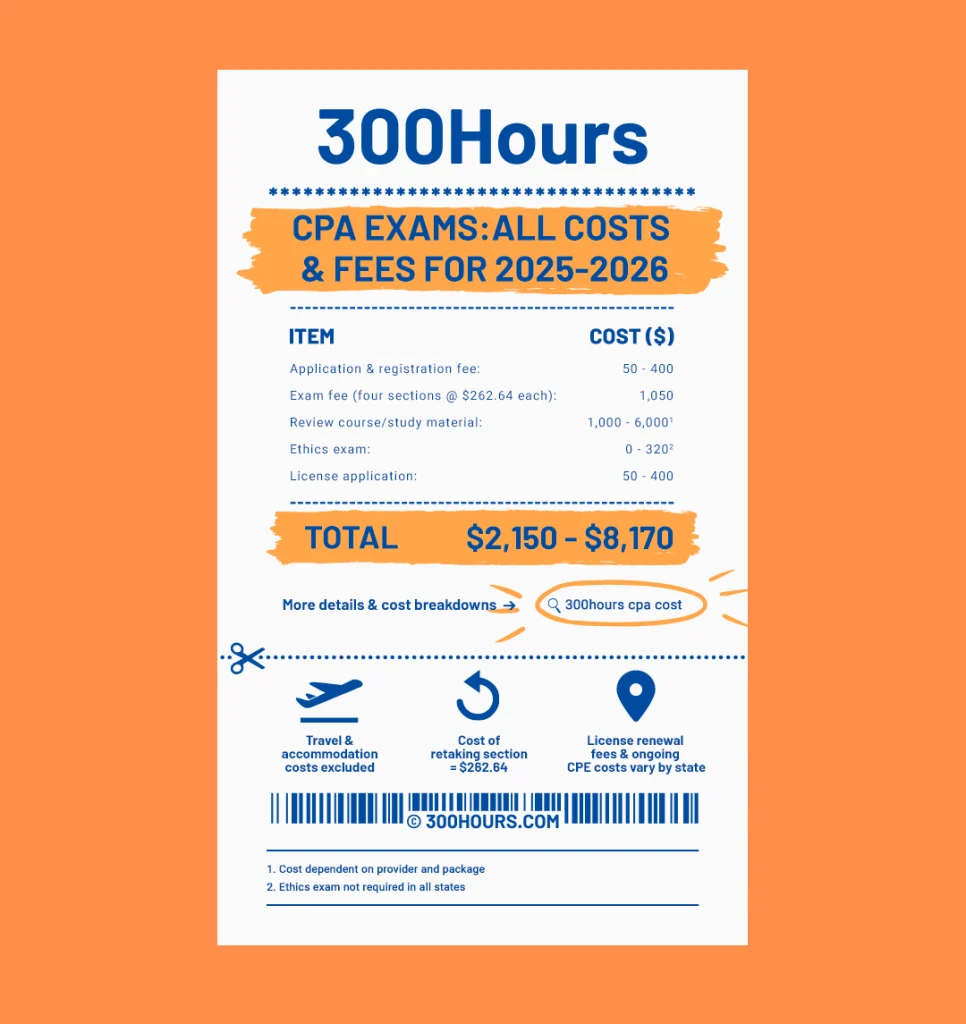
Let’s get straight to the numbers. Here’s a breakdown of the main costs involved:
| Item | Cost |
|---|---|
| Application & registration fee: | $50-$400 |
| Exam fee (four sections @ $262.64 each): | $1,050.56 |
| Review course/study material: | $1,000-$6,000 |
| Ethics exam: | $0-$320 |
| License application: | $50-$400 |
| CPA total cost: | $2,150.56-$8,170.56 |
In terms of how to become a CPA, the cost in the U.S. isn’t one flat figure. This is because:
- Costs vary by state: Each state charges a different amount for exam application and registration, license application, and a separate ethics exam.
- Study materials: While not a requirement, study materials are recommended and vary in price depending on which one you choose.
However, most CPA candidates will realistically spend in the region of $3,000 to $7,000 on their full journey to licensure.
That puts the CPA exam somewhere around the middle of the top financial designations in terms of upfront costs. But it’s also one with among the strongest potential ROI once you’re licensed.
We’ve excluded the costs involved in meeting the CPA education requirements from our total (completing a bachelor’s degree, and for most candidates, completing extra credits such as a master’s degree). This helps to compare CPA exam costs with other financial qualifications, which typically have similar educational requirements.
Now that we’ve looked at it from the top level, let’s explore each part of the CPA exam costs in more detail, along with additional costs you should be aware of.
1. CPA exam application & registration fees

Before you can sit for the CPA exam, you’ll need to apply to your state board (or its designated agency, like NASBA). That’s where application and registration fees come in. Think of them as your ticket to enter the process.
These fees cover the administrative side of the exam, which includes verifying your credentials and eligibility, handling and managing supporting documentation, and maintaining your candidate file. They’re not glamorous, but without paying them, you can’t even usually schedule your first exam.
Application fee: $50-$400
- This is a one-time charge the first time you apply to take the CPA exam in a state.
- It covers processing your transcripts, verifying you meet education requirements, and setting you up in the system.
Registration fees: $10-$100 per section (in most states)
- This is a separate fee each time you register for exam sections.
- You might pay once for all four sections if you register in bulk, or multiple times if you spread them out.
State examples of CPA application and registration costs
Here’s how these costs look in practice for a few example jurisdictions:
| State | Application Fee | Registration Fee | Application + Registration Total |
|---|---|---|---|
| California | $100 | None | $100 |
| Texas | $20 | $15 per section | $80 |
| Florida | $50 | $75 per section | $350 |
| New York | $170 | $85 per section | $510 |
As you can see from these examples, the specific way in which CPA exam applications and registrations are handled differs from state to state. This means total costs can vary between states by several hundred dollars.
What to watch out for
- Multiple registrations mean multiple fees: If you only register for one or two sections at a time, you may pay registration fees more often.
- Non-refundable: If you don’t sit for the sections you registered for, you won’t usually get these fees back.
- Deadlines: Once you’re issued an NTS (Notice to Schedule), you must schedule your exam within that window (usually 6–12 months depending on state). Miss it, and you’ll pay again.
So if you’re confident you can study for and sit multiple CPA exam sections within one NTS window, it’s usually cheaper to register for them all at once. But don’t overcommit, because failing to take an exam before your NTS expires is essentially wasted money.
2. Uniform CPA exam fees
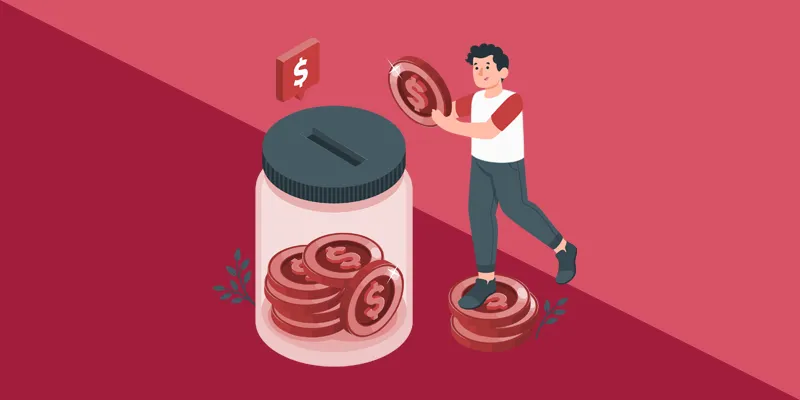
Once you’ve cleared the admin hurdle of applying, it’s time to pay for the main event: the CPA exams themselves.
Uniform CPA exam cost: $1,050.56 ($262.64 per section) in 2025-2026
The CPA exam is called the Uniform CPA exam because every candidate across the U.S. takes the same exam, regardless of state. That means content, scoring, and administration are consistent nationwide.
Because the exam is uniform, the exam section fees are standardized, too. No matter where you sit for it, you’ll pay the same amount per section to NASBA (the National Association of State Boards of Accountancy).
There are four exams you need to pass, which you can take in any order:
| Exam Section | Cost |
|---|---|
| AUD (Auditing & Attestation) | $262.64 |
| FAR (Financial Accounting & Reporting) | $262.64 |
| REG (Taxation & Regulation) | $262.64 |
| One Discipline (choose one): – BAR (Business Analysis & Reporting) – ISC (Information Systems & Controls) – TCP (Tax Compliance & Planning) | $262.64 |
| Total | $1,050.56 |
Why your cost might be higher
- Retakes: Fail a section and you’ll need to pay the full fee again.
- Rescheduling: The exam fee itself doesn’t change, but Prometric charges if you move your test date too close to exam day.
- International candidates: Sitting outside the U.S. comes with extra administration fees.
We’ll look at these and other extra costs more closely later in this guide.
3. CPA Ethics exam fees (if applicable)
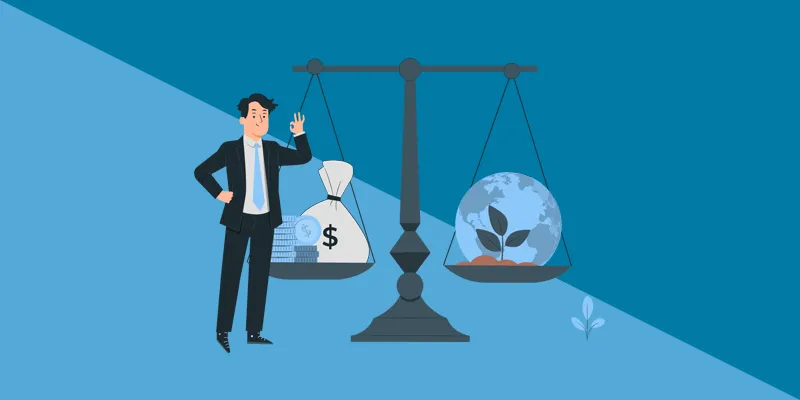
Passing the Uniform CPA exam isn’t always the final hurdle. In most states, there’s an extra requirement: an ethics exam you’ll need to pass to get your license.
This is designed to test a CPA candidate’s understanding of professional ethics, integrity, and responsibilities in the accounting field. It ensures future CPAs can apply ethical principles to real-world situations and uphold public trust in the profession.
CPA ethics exam cost: $0-$320
Not all state boards require an ethics exam, so if you are applying for your license in a state that doesn’t, there is no cost to cover.
However, around 35 states do require candidates to pass a separate ethics exam as part of the licensing process.
The most common version is the AICPA Ethics Course and Exam. This costs:
- $250 for AICPA members
- $320 for non-members
Some states use their own version of an ethics exam, which can have different pricing. (For example, California has its own “PETH” exam, priced separately.)
Since the majority of states have an ethics exam requirement, most candidates should plan to set aside around $250-$320 for this step.
4. CPA study material costs (optional but recommended)

The best CPA study materials, exam prep, and review courses are part coach, part drill sergeant, and part cheerleader. Their role is to ensure you’re fully prepared, keep you on track with your studying, and give you the best shot at passing first time.
But the thing is, CPA study materials vary wildly in style, features, and price. Some are packed with different types of content, practice questions, and a range of study options to help you learn. Meanwhile, others are lean, no-frills programs that get the job done, but work best if you’re disciplined.
Here’s how the main options stack up:
| Provider | Cost Range | Highlights |
|---|---|---|
| Becker | $2,500-$6,000 | Premium, comprehensive content that’s widely used by Big 4 firms. |
| Gleim | $1,000-$3,500 | A good option for value seekers who want huge question banks and detailed explanations. |
| Surgent | $800-$1,700 | Well-suited to busy professionals who like adaptive learning that shortens study time. |
| UWorld | $700-$2,400 | Mid-range, strong video lectures, and an engaging teaching style. |
| Universal | $200-$1,000 | Good for visual learners; great graphics and animations at a low price. |
| Ninja | $67-$87/month (per section) | Cheapest supplement or stand-alone for self-motivated students. |
| i-75 | Around $100/month (per section) or $1,000 bundle | Bare-bones but effective; strong if you’re disciplined and want a lower-cost option. |
Choosing the right CPA study material
Not every choice of review course or study material looks the same, and not every candidate studies the same way. The trick is to match a course’s features with your learning style, schedule, and budget.
So be honest about where you’ve struggled in the past and the kind of help you’re looking for:
- If you find it hard to stay on-track with studying for the CPA exams, a package with coaching or built-in deadlines might save you money in the long run by helping you pass on the first attempt.
- If you’re disciplined and just need lots of practice questions, a simpler and cheaper package may be all you need.
For help picking the right option for your needs, head over to our in-depth guide: Get the Lowdown on the 7 Best CPA Study Material.
5. CPA licensing fees & ongoing costs
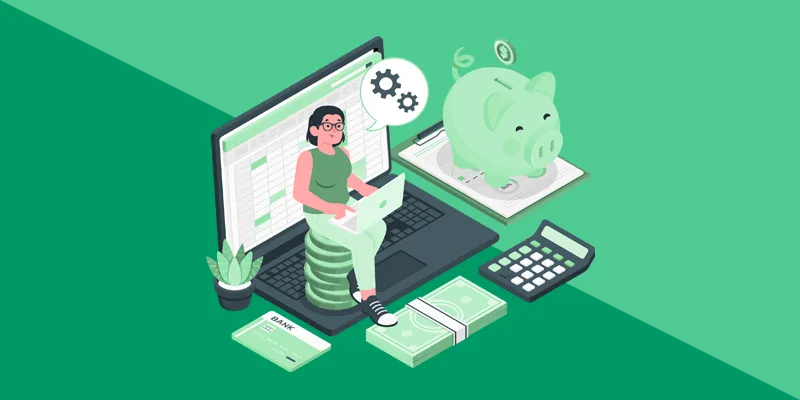
Passing the exams is a huge milestone, but you’re not quite a CPA yet. You’ll also need to apply for and maintain your license, and that comes with its own set of fees.
Initial license application: $50-$400
After you’ve passed all four exams (and completed any required ethics exam), you’ll need to submit a license application to your state board. This covers processing your paperwork, verifying your work experience, and then issuing your license.
The cost of this is usually $50-$400+, depending on your state.
Each state has its own set of fees when it comes to licensing, and each issues licenses in a slightly different way. Here are a few examples:
- California: $340 for the initial license plus $250 application fee.
- Texas: $50 initial license issuance.
- New York: $427 total (includes application and first three years of registration).
License renewal fees: $50-$400 per renewal cycle
Once licensed, you’ll need to renew periodically (every 1–3 years, depending on your state). Renewal fees help fund board operations and confirm you’re meeting CPE requirements.
Like the initial license fee, renewal fees typically cost $50–$400 per cycle.
Again, each state sets its own fees for license renewal, and the period of time between renewals also varies between jurisdictions. Here are some examples:
| State | CPA Renewal Free | Renewal Cycle |
|---|---|---|
| Texas | $118 | 1 year |
| Florida | $105 | 1 year |
| New York | $292 | 3 years |
| Illinois | $120 | 1 year |
| California | $200 | 2 years |
While costs between states do vary, renewals are a relatively small (but unavoidable) ongoing expense. However, it’s worth being aware of the fact that many boards charge penalties if you miss the renewal deadline, so it pays to get your renewal submitted on time!
CPE & ongoing costs: $0-$1000 per year
To keep your license active, you’ll need to complete continuing professional education (CPE) on a regular basis in most states. This typically runs on a one, two, or three year cycle depending on your state.
What exactly is CPE?
CPE is designed to ensure CPAs keep up to date on accounting standards, tax laws, ethics, and other professional knowledge.
Each state board sets its own requirements, but most ask for around 40 hours of CPE per year (or 80 hours every two years if operating on a two-year cycle, for example).
How much does CPE cost?
The cost (to the individual) depends on how you fulfill the requirement:
- Employer-sponsored CPE: Most public accounting firms and large employers cover these costs for you, either in-house or by reimbursing external courses.
- State CPA societies: Often provide discounted CPE to members. Membership dues themselves can run $200-$400 annually, but can save you money overall.
- Independent providers: Online courses range from $10/hour (for basic self-study) to $50-$100/hour for specialized topics. Full 40-hour packages often cost $500-$1,000 per year.
Ultimately, CPE is a recurring cost that doesn’t stop once you’re licensed, but is a necessary part of maintaining your license.
How CPA exam costs vary by state

Unlike the Chartered Financial Analyst (CFA) exam, which has one global fee schedule, the CPA exam is governed at the state level. That means two candidates, both taking the exact same exam, can end up paying different amounts to complete the process and get their license once they pass.
In the same way that CPA requirements differ between states (such as education, ethics requirements, and work experience), the costs and how fees are managed also differ.
The CPA costs that differ between states
Even though the uniform exam section fees are the same nationwide, the state-level charges for other items vary:
1. Costs to take the exams
- Application fees: The one-time fee when you first apply to sit the CPA exam differs from state to state.
- Registration/eligibility fees: Some states charge every time you sign up for exam sections, while others don’t.
2. Costs to get licensed
- Ethics requirements: Some states require the AICPA ethics exam ($250–$320), others mandate their own version, and a few don’t require one at all.
- License issuance fees: Once you’ve passed, there’s a separate charge to actually issue your CPA license, which is set individually by each state.
3. Ongoing costs once licensed
- Renewal fees: These vary in both amount and cadence: some states renew annually, others every two or three years, and each state sets its own cost.
State-specific CPA cost examples
Let’s take a look at some examples of these differences between states. This shows the costs to take the exam and obtain a CPA license.
Note: The costs below do not include CPA study material or review courses, which are the same regardless of where you’re located.
| Cost | California | Texas | New York | Florida | Illinois |
| Application Fee | $100 | $20 | $170 | $50 | $120 |
| Registration Fee | None | $15 per section | $85 per section | $75 per section | None |
| AUD Exam | $262.64 | $262.64 | $262.64 | $262.64 | $262.64 |
| FAR Exam | $262.64 | $262.64 | $262.64 | $262.64 | $262.64 |
| REG Exam | $262.64 | $262.64 | $262.64 | $262.64 | $262.64 |
| Discipline Exam | $262.64 | $262.64 | $262.64 | $262.64 | $262.64 |
| Exam Total | $1,150.56 | $1,130.56 | $1,560.56 | $1,400.56 | $1,170.56 |
| Ethics Exam | None | AICPA ($250–$320) | None | None | AICPA ($250–$320) |
| License Fee | $340 | $50 | $427 (includes first renewal) | $50 | $120 |
| Exam + License Total | $1,490.56 | $1,500.56 | $1,987.56 | $1,450.56 | $1,610.56 |
| License Renewal | $340 biennial | $118 annual | $292 (triennial) | $105 (biennial) | $120 annual |
We’ve highlighted some of the most popular states here, but fees do change regularly. For the most up-to-date information, check directly with your state board. You can find every board’s website through NASBA’s State Boards Directory.
Who you actually pay CPA exam costs to
One part of CPA costs that can be confusing is who you actually pay. Again, the answer depends on your state.
Application & registration fees
These are always paid to your state board of accountancy (or its designated agency). These fees cover verifying your eligibility, reviewing transcripts, and issuing your Notice to Schedule (NTS).
Examination fees
These are the fees you pay for each of the four sections of the CPA exam. They’re set nationally by NASBA and are the same in every state ($262.64 per section).
But where it can get confusing is that the collection process for exam fees varies:
- In some states, you pay the exam section fees directly to your state board. The board then forwards the exam fee to NASBA.
- In other states, you pay only the registration fees to the board. Once approved, NASBA will invoice you separately for your exam sections.
The end cost is the same, but the billing path is different, and it can make the process seem more complicated than it really is.
So, always check your state board’s instructions carefully to see if you need to pay them for both your registration fees and exam fees, or just your registration fees. Missing a payment step (or assuming NASBA will bill you when your board expects to collect everything) can delay your ability to schedule exams.
Extra costs involved in passing the CPA exam

The big-ticket costs of becoming a CPA are fairly predictable. These are application fees, exam fees, and the cost of study materials (often the largest expense). Then there’s the cost of an ethics exam if you need it, and the cost to apply for your license once you have completed all the exams.
But there are also a handful of “hidden” costs that can sneak up on you if you’re not prepared. It’s not likely that all of these will apply to every candidate, but it’s worth being aware of them in case some of them are applicable to you.
Here are the main extra costs to watch out for:
1. Travel and accommodation: cost varies
Not every CPA candidate lives around the corner from a Prometric testing center. If your nearest site is hours away, you may need to budget for travel, or even an overnight stay.
For many candidates, this just means a tank or two of gas (or a bus or train ticket if you don’t drive), and maybe a modest hotel bill. But if you’re in a rural area or a state with fewer test centers, the costs can still add up, especially if you need to make the trip multiple times across four exam sections.
Plan ahead by checking all nearby Prometric CPA locations. Sometimes crossing into a neighboring state is cheaper and more convenient than heading to the closest center in your own. Although this will mean you’ll need to check the CPA requirements of that state (including any state residency requirements), the costs involved, and make sure you apply to the correct board.
2. Fingerprinting / background checks: $30-$100
Several state boards require candidates to submit fingerprints or undergo background checks as part of the licensing process. These services usually cost $30–$100, depending on the state and the provider you use. It’s not a huge expense, but it’s worth knowing about so you’re not caught off guard.
3. Retaking failed exams: $262.64 per section + registraion fee
Each exam section costs $262.64. If you fail a section, you’ll need to pay the full fee again to retake it. On top of that, in some states you may also need to pay another registration or eligibility fee. Fail more than one section, and this can add up quickly (another reason it is important to develop your strategy for how to pass the CPA exam).
4. Rescheduling fees: $0-$100
Life happens, and sometimes you need to move an exam date. Unfortunately, Prometric charges fees for rescheduling within certain windows:
- More than 30 days before your exam: usually free.
- 5–30 days before: expect a rescheduling fee (typically around $35–$80).
- Within 5 days of your exam: the fee jumps higher (often over $100).
- Less than 24 hours before: you may forfeit your exam fee entirely.
This is why it’s recommended that you only schedule sections when you’re reasonably confident you’ll be ready. Otherwise, you risk paying twice.
To help get your exam scheduling right, head over to: CPA Exam Dates & Score Release: Your 2025-2026 Master Plan
5. Interstate transfers & credential verification: $0-$50
Most CPA candidates stay within one state from start to finish. But if you ever move during the process or need to practice in another state, you may face interstate transfer fees.
- Grade transfers: If you passed sections in one state and want to apply them to another, you’ll often need to request a grade transfer.
- License verification: Already licensed? You may need to send proof of your license (a “Certificate of Good Standing”) to the new state.
These fees aren’t standardized by NASBA. Instead, each state board sets its own amount:
- Some states provide transfers free of charge
- Most charge a fee of about $25 per request.
- A few states charge a higher fee of around $50 depending on the type of request and transfer.
Just to clarify, this is different from the exam section fees you pay. Interstate transfer fees only apply if you’re changing jurisdictions or requesting credential verification.
If you think you might move states during the CPA exam process, factor in the possibility of paying extra for grade transfers or verifications. For the latest amounts, check NASBA’s Authorization Fee Schedule or your state board’s website.
6. College credits: cost dependent on school
If you only have a 120-credit bachelor’s degree, you’ll need another 30 credits to meet the 150-hour requirement for licensure. While this isn’t actually required before you take the exams in most states, it’s something you’ll need to factor in to get your CPA license.
How much this costs depends on where you earn them. Getting your credits at a community college or via an approved online program could run you a few thousand dollars. If you enroll in a graduate course (such as a Master’s in Accounting) the cost could be anywhere from $10,000 to $20,000 and up.
This can be one of the biggest potential “hidden” costs for candidates who need to make up the credit difference to get their CPA license, particularly if they choose to earn their credits at a higher cost school.
CPA exam costs for international candidates

If you’re sitting the CPA exam outside the U.S., the process usually comes with extra costs. You’ll still pay the same exam section fees ($262.64 per section x four sections total), but there are additional charges and sometimes logistics to plan for.
International administration fees: $356 per section
NASBA charges an international administration fee per section if you sit at an exam center outside the U.S. Currently, this fee is around $356 per section. That’s on top of the regular $262.64 exam fee.
This means each section could cost $618+ for international candidates, and all four sections together add up to more than $2,400 in exam fees alone.
Evaluation of education: $150-$250
If your degree was earned outside the U.S., you’ll likely need to have your transcripts evaluated by an approved credentialing agency. These evaluations typically cost around $150–$250, though complex cases can be more.
Licensing in the U.S: $50-$400
As the CPA is predominantly a U.S. license, even if you test abroad, you must apply for licensure through a U.S. state board. That means paying that board’s licensing fee, just like domestic candidates.
The costs are the same as U.S. candidates would pay, which is around $50 on the low end, up to around $400 on the high end, depending on which state you apply to.
Travel and accommodation: cost varies
Even with international test centers, not every country is covered, and availability may be limited. Many international candidates therefore budget for flights, hotels, transport, and meals if they need to travel to a major exam center (either in the U.S. or in another country).
How to save money on the CPA exam

Taking the CPA exams can be a significant investment, although usually one that’s well worth it if you’re committed to a career in accounting.
But that doesn’t mean it has to break the bank. With a bit of sensible planning about how you’re going to approach the CPA, there are a few ways you can keep costs down without cutting corners.
1. Check if your employer will pay
A lot of CPA candidates are already working in accounting or finance while studying for their exams. That helps to meet the work experience requirement for licensure, but it’s also sometimes the case that their employer will financially support their CPA journey.
If you work for a public accounting firm, especially one of the Big 4 or mid-tier firms, there’s a good chance they’ll cover some or all of your CPA costs. But it’s not just accounting firms who do this; many employers in finance, corporate accounting, and government also offer professional development benefits.
For example, some Fortune 500 companies cover CPA review courses for staff in finance roles, and several state agencies reimburse license and renewal fees for government accountants.
Typical costs employers might cover include:
- Application and registration fees
- Uniform CPA Exam fees
- Review course costs (sometimes only a specific provider)
- Initial license application and renewal fees
- CPE and ongoing training
Even if it’s not advertised, or if you didn’t find out while interviewing, ask your HR or training department. Since you need to log experience hours anyway, there’s a good chance your employer already has a support program in place and you might be surprised at what’s covered.
2. Bundle exam registrations wisely
In many states, you’ll pay a registration or eligibility fee each time you sign up for exam sections. If you register for just one section at a time, those fees can begin to stack up.
To save money, it often makes sense to bundle your exam registrations:
- Register for two or more sections at once, so you only pay the fee once.
- But make sure the timing is realistic; your Notice to Schedule (NTS) is only valid for a limited window (often 6–12 months, depending on the state).
- If you over-schedule and don’t sit for a section before your NTS expires, you’ll lose the fees you already paid and have to re-register.
For example, in New York, the registration fee is $85 per section. Registering separately for all four sections could cost $340 in registration fees alone. But if you register for two sections at a time, you’d only pay $170 total (saving yourself $170).
A balanced approach works best here between scheduling enough sections together to reduce costs, but not scheduling too many so you’re unable to complete them. So plan your CPA exam order, register for the sections you’re confident you can complete in your NTS window, and avoid the costly mistake of paying for sections you don’t end up sitting.
3. Choose the right review course for your style (and budget)
Review courses can often make up the largest chunk of CPA exam costs, and there are options available at a wide range of prices.
What you’re looking for here is value for money. That doesn’t just mean going for the cheapest one. It means finding the course that hits the sweet spot of providing everything you need as an individual, at the best price.
Here are some things to think about to help you choose the best CPA review course to match your study style and strategy:
- Need structure and coaching? Go for a premium course (like Becker or Surgent) that includes structured study plans, instructor access, and sometimes even one-on-one coaching. These are pricier, but they keep you accountable.
- Prefer lots of practice questions? Providers like Gleim and UWorld are known for massive question banks and detailed answer explanations, which are great if you learn by drilling problems until they click.
- Like engaging video content? UWorld or Universal provide lively, easy-to-follow lectures and visuals for people who want concepts broken down clearly.
- Just need a supplement? If you’re self-motivated or already strong in accounting theory, something lightweight like Ninja CPA can work as a low-cost supplement, especially for practice questions and audio/notes on the go.
- Confident you have disciplined study habits? Providers like i-75 keep costs down without a lot of bells and whistles. If you know you can stay on track independently, these can get the job done for under $1,000.
4. Try to avoid rescheduling and retakes
Every time you reschedule an exam or fail a section, it costs you money. Prometric charges rescheduling fees if you change your date too close to exam day, and each retake means paying the full $262.64 exam fee again, plus potentially any state registration fees.
Beyond the dollars, rescheduling or retaking also stretches out your CPA journey, which can affect your motivation and delay your license (and salary increases that come with it).
While failing is something that happens (plenty of candidates need to re-take CPA exams), try to set yourself up for success from the start by building a realistic and effective study plan before you register.
Schedule each section when you’re confident you can commit the time. Passing on the first try isn’t just good for your pride and your stress levels, it can also help you to save hundreds of dollars.
5. Take advantage of discounts
Review courses and membership fees can be pricey, but there are a few ways to trim the cost if you’re paying out of pocket.
- Seasonal promotions: Many CPA review providers run big sales around Black Friday, back-to-school season, or year-end. If you’re not in a rush, waiting for one of these windows can save you money.
- Student discounts: If you’re still in school, or even a recent graduate, some providers offer special pricing. This can often be around 20–30% off, which can be the equivalent to several hundred dollars.
- State CPA society bundles: Joining your state CPA society does usually come with its own set of fees, but many societies also negotiate discounts on major review courses like Becker or Surgent, so it can work out as a net saving.
- Monthly plans: Some providers let you spread costs out over time rather than making a single up-front payment. While this doesn’t reduce the total cost, it can make budgeting easier to manage and enable you to move forward in your CPA journey more efficiently.
So before diving straight in and purchasing a CPA review course or study material, check both the provider’s website and your state CPA society’s member perks. A few minutes of research here can mean the difference between paying list price and getting a much more manageable deal.
FAQs about CPA exam costs
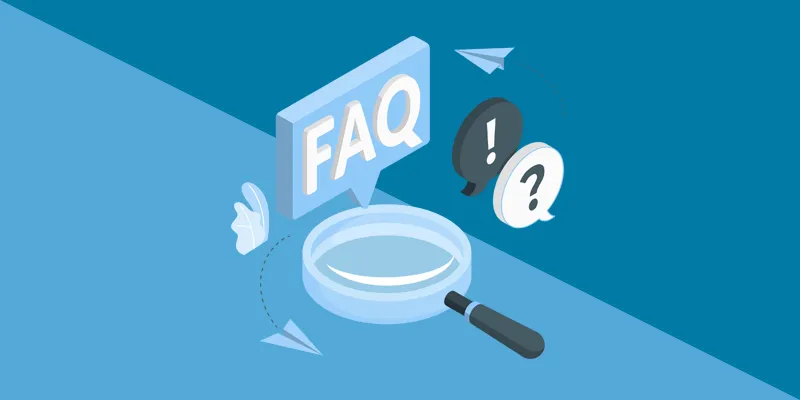
What CPA exam costs mean for you

Becoming a CPA isn’t exactly cheap, but it’s likely one of the best investments you can make in your accounting career. Although, as we’ve covered in this article, precisely how much you’ll spend depends on where you live, how you prepare, and how smoothly you move through the exams.
Here’s how that plays out for three common types of candidate:
Bare minimum scenario:
- You pass all four exams on the first try.
- You choose not to use a review course.
- You live in a state with low registration costs and no ethics exam requirement.
- Total cost: around $1,500 – $2,000
Typical candidate (most people):
- You pass all four exams on the first try.
- You choose a mid-level review course.
- You live in a state with standard registration costs, and an ethics exam requirement.
- Total cost: around $3,000 – $7,000
Maxed-out spend:
- You need to retake one or two CPA exams.
- You choose a premium level review course.
- You live in a state with higher than average registration costs, and an ethics exam requirement.
- You need to earn extra semester credits to meet the education requirements for your license.
- Total cost: around $10,000 – $20,000+
Is the CPA exam worth the cost?
If you’re thinking about taking on the CPA, the good news is that looking at the potential upside (which includes a CPA salary with higher earning power, more job options, and long-term career stability), the designation often pays for itself within the first year or two of licensure.
So if you’re serious about accounting as a career, the CPA is usually a smart move and can definitely be a worthwhile investment.
However, it does involve quite a bit of hard work and dedication, so it’s key that you plan your study schedule and exam strategy effectively. You also need to make sure you understand your state’s specific costs, processes, and requirements, and invest in the right prep tools for your learning style.
Do all that, and the CPA exam costs will feel like money well spent!
Here are some other articles you might find useful: